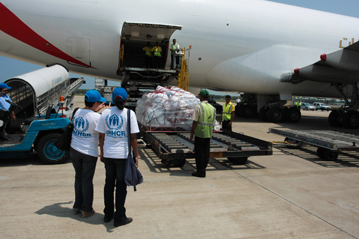Heavy rains hamper relief efforts in eastern Chad
Heavy rains hamper relief efforts in eastern Chad

ABECHE, Chad, July 6 (UNHCR) - Heavy rains in eastern Chad are hampering the UN refugee agency's efforts to reach tens of thousands of Sudanese refugees near the Chad-Sudan border, prompting UNHCR to speed up refugee relocation before the rainy season reaches the north.
After months of forecasting, the rainy season has arrived in earnest in the middle part of a 600-km stretch of the Chad-Sudan border where an estimated 170,000 Sudanese sought refuge after fleeing fighting in Sudan's Darfur region. Flooded wadis (seasonal river beds) have cut off access to some roads, preventing UNHCR and its partners from transporting refugees and relief items in the border areas.
Over the weekend, two UNHCR trucks got stuck in a flooded wadi between Abéché, the main city in eastern Chad, and the border town of Adré. One truck managed to drive out while the other remains stuck.
"The trucks were empty when they got stuck, which shows how much more difficult it will be soon to travel on these roads with trucks loaded with food, relief supplies or refugees," said UNHCR spokeswoman Jennifer Pagonis at a news briefing in Geneva Tuesday.
UNHCR has redirected 13 trucks to speed up the relocation of some 14,000 refugees still at the Adré border to camps further inland.
The flooded wadi also prevented another group of inter-agency staff from crossing to Breidjing camp and a new camp site at Treguine on Sunday. Some of the team members crossed the wadi on foot and hired a small truck on the other side to continue their journey to the two camps to conduct water supply evaluations.
Further south, where it is raining almost every other day, the roads from Abéché to Goz Beida town have been cut off. Goz Beida is only accessible by plane now. Fortunately, the nearby camps of Djabal and Goz Amer have pre-positioned enough food and relief supplies to last the relocated refugees until November, when the rainy season is expected to end.
UNHCR is positioning a second aircraft at Abéché to make short flights between the field offices and to fly in supplies if needed.
The rains are still infrequent in north-eastern Chad, allowing UNHCR and its partners to continue assisting refugees without major interruptions. However, a team from the Norwegian Church Aid was carjacked on the way from Touloum camp to Iridimi camp on Sunday. The NCA vehicle was flagged down by a man standing along the road, who then pulled out a gun, boarded the pickup and ordered them to drive to the bush, picking up a group of seven heavily armed masked men in military clothing en route. The aid workers were finally released near the town of Bahai at around 4.30 pm. The hijackers removed the NCA and UNHCR logos which were on the doors of the car and drove away.
Meanwhile, UNHCR plans to relocate refugees in Bahai and Cariari to a new site at Oure-Cassoni starting next week, after a vaccination campaign against polio and measles. The vaccination by the UN Children's Fund and the International Rescue Committee should start on Wednesday, as two cases of measles have already been detected among the refugees in Bahai.
At Oure-Cassoni, 750 tents have already been set up, 1,250 more will be installed in the coming days and another 2,000 are expected to arrive in the near future. The site is located 20 km away from the border - rather than the preferred 50 km as used for the other camps - because it has proven impossible to find a site in this area with enough water resources at a 50-km distance from the border. For Oure-Cassoni, three trucks will bring in water from the nearby lake at first. In the longer term, the refugees will be able to get water from six wells, four of which are already under construction.
More than 118,000 Sudanese refugees have moved to eight camps in eastern Chad since UNHCR started relocation convoys in January.









